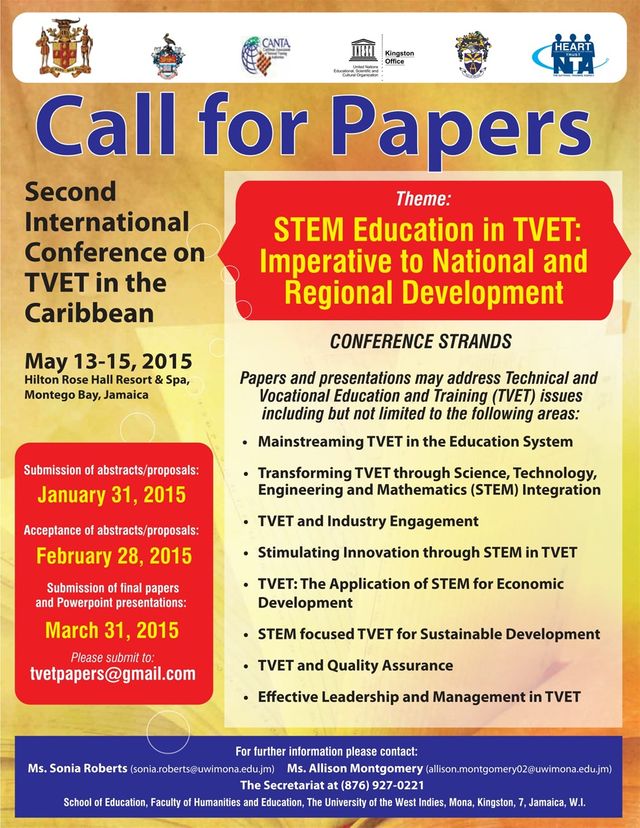Welcome Messages & Profiles of Speakers
Conference Strands
UWI/ UNESCO TVET CONFERENCE: MAY 2015
STRAND 1: Mainstreaming TVET in the Education System
This strand addresses the need to have systems and structures that will ensure that TVET is integrated as an important aspect of general education. The CARICOM TVET Strategy 2012 recommends that TVET should be integrated with general education for life and livelihood. Submissions for proposals for this strand can address:
· Models for integrating TVET in the general education system
· Coordinating the efforts of secondary and tertiary providers in the delivery of workforce training
· Aligning formal and informal learning in TVET
· Building collaborative relationships in TVET Integration
· Promoting quality assurance in TVET according to context
STRAND 2: STEM Integration in TVET
It is recognized that the STEM approach to learning helps to foster innovation and creativity. Recognizing this, the Ministry of Education in Jamaica is seeking to promote institutions with a STEM focus. Areas for integrating STEM in TVET can consider
· The integration of TVET and STEM in higher education
· How STEM can contribute to economic development
· Approaches for strengthening innovation and creativity in TVET through the integration of STEM.
· Building the capacity of TVET professionals to integrate STEM
· Leadership for STEM implementation
· Influence of Arts in STEM for TVET
STRAND 3: TVET and Industry Engagement
This strand examines the need to coordinate the efforts of TVET with industry to ensure programme relevance and workplace ready graduates. It recognizes that industries are key stakeholders in TVET and hence their needs should be taken into account in the development and delivery of relevant TVET programmes. Submissions for this strand can address:
· Developing and maintaining private and public partnerships in TVET
· Reducing skills mismatch through labour market aligned programmes
· Using TVET to address crisis in the economy
· Developing mechanisms to promote the active involvement of industry stakeholders
· Policy framework to drive industry engagement
· Industry responsibility in TVET
· Foreign Industries and their impact on local TVET
STRAND 4: TVET and Quality Assurance
Conference strand proposals for TVET and quality assurance should focus on the policies and mechanisms for improving teaching and learning and expanding access to quality TVET programmes. Proposals for submission can focus on:
· TVET Training Approaches and Practice
· The Competency Based Education and Training Approach
· Curriculum Development in TVET for Workforce Development
· Information and Communication Technology for Workforce Development
· Evaluation of TVET Projects and Programmes
· Strengthening teaching standards at all levels
· Engaging at risk and marginalized groups in TVET
· Strengthening access by improving gender equality
· Encouraging flexible pathways in TVET to facilitate access and progression
· National Qualifications Framework
· Blended and Online Learning
· Learner Profiles in the development and delivery of effective TVET programmes
STRAND 5: Effective Leadership and Management in TVET
Leadership and management in TVET is critical to effective TVET systems and quality TVET institutions. Leadership is necessary in developing the capacities of TVET professionals, engaging major stakeholders and ensuring that investment in TVET leads to social and economic development. Proposals for this strand can focus on:
· Managing TVET for national, regional and economic development
· Programmes for developing the leadership capacities of TVET professionals
· Improving coordination of various stakeholders in TVET
· Implementing systems to strengthen accountability in TVET
· Ensuring the relevance of TVET to current labour market needs
· Mechanisms for ensuring TVET is responsive, flexible and integrated
· Financial management of TVET
· Funding schemes to facilitate at risk and marginalised groups
STRAND 6: TVET for Sustainable Development
Among the Shanghai recommendations for TVET (2012) is the need to enhance the relevance of TVET by focussing on green economies and green societies. “Since education is considered the key to effective development strategies, technical and vocational education and training (TVET) must be the master key that can alleviate poverty, promote peace, conserve the environment, improve the quality of life for all and help achieve sustainable development (Bonn Declaration of Learning and Work 2004).”
· Capacity building for teachers
· Integrating sustainable development in the TVET Curriculum
· TVET for Economic Development and Environmental Sustainability
· TVET for social and cultural sustainability
· Addressing negative perceptions of TVET
· Using TVET to bridge class divide
· Using evidence based research to inform policy and planninClick here for moreg in TVET
· Monitoring and evaluation of TVET programmes
Proceedings
Abstracts
Presentations
Photo Gallery
Contents to be uploaded
Share this page

